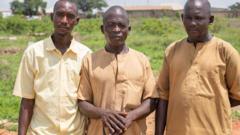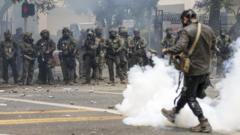The Abdullahi family, committed to serving the community for over 50 years at Kaduna's biggest graveyard, has recently begun receiving salaries for their long-unpaid volunteer work, highlighting both their dedication and the community's appreciation of their efforts.
A Legacy of Service: The Abdullahi Family's Five Decades at Kaduna Cemetery

A Legacy of Service: The Abdullahi Family's Five Decades at Kaduna Cemetery
For over 50 years, the Abdullahi family has dedicated themselves to the maintenance and burial services at Kaduna's Tudun Wada Cemetery, receiving little compensation until now.
For more than half a century, the Abdullahi family has selflessly dedicated their lives to the Tudun Wada Cemetery in Kaduna, Nigeria's northern region. This sprawling graveyard, established a century ago, serves as the final resting place for Muslim residents, and the family’s contributions have been vital to maintaining its operations, despite receiving little to no formal pay until recently.
The family's involvement began in the 1970s when two brothers, Ibrahim and Adamu Abdullahi, started working in the cemetery. Tragically, both brothers are now buried there, leaving their children to carry on the family’s legacy as the primary caretakers. "Our parents instilled in us the idea that serving others is a divine duty that will be rewarded by God," shared Magaji, Ibrahim’s eldest son, now the cemetery's overseer.
Each day, Magaji and his cousins, Abdullahi and Aliyu, report for work at 7 AM and are prepared to dig graves according to traditional Muslim rites, which require burials to occur swiftly after death—a matter of hours, often necessitating them to work tirelessly. The task can be arduous, especially under the sweltering Kaduna sun where they could dig up to a dozen graves in a single day.
The family’s operations took a tumultuous turn during periods of religious conflicts, necessitating their services when tensions escalated between Kaduna's Christian and Muslim communities. "That experience strengthened my resolve to continue this work," recalls Magaji, who described the heavy responsibilities faced during such times.
As funerals commonly occur the same day as death, the local mosques often notify mourners through prayer announcements. The Abdullahis play pivotal roles, handling body preparations and the digging of graves, culminating with a respectful ceremony before tending to the gravesite.
In recent weeks, the local council, acknowledging the family’s enduring labor, has decided to compensate them for their efforts with monthly salaries—an unprecedented development for the Abdullahi family. Despite the pay being below the national minimum wage, it marks a significant change in their longstanding tradition of volunteering.
Local council chairman Rayyan Hussain expressed commitment to improving conditions at the graveyard, with plans to address maintenance, security, and the construction of facilities for body preparation. Meanwhile, the Abdullahi family continues to nurture their small farm to supplement their income.
As with each burial, they feel a connection to the deceased, retaining mental maps of every grave, testifying to their deep-rooted dedication to their work. The hope for the future remains, with Magaji wishing to see one of his children follow in their footsteps, ensuring that the legacy of caring for Kaduna’s cemetery is never forgotten.






















